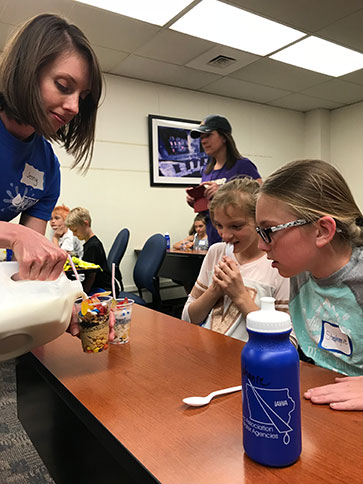
| May 2018 | |||||||||||
| Top stories | |||||||||||
| In the news | |||||||||||
| Photos | |||||||||||
| Contact us | |||||||||||
| Archive | |||||||||||
|
Children learn the wonder of water |
May 31, 2018 --
More than 2,300 Iowa fifth graders met in Ankeny on May 10 to learn about the wonders of water at the 2018 Iowa Children’s Water Festival. The festival, in its 22nd year, attracted students from as far away as Omaha in the west and Keokuk in the east.
 Jenny Puffer (left) of Fox Engineering in Ames helps a fifth-grader build an edible aquifer.
Jenny Puffer (left) of Fox Engineering in Ames helps a fifth-grader build an edible aquifer.
Five staff members of the State Hygienic Laboratory presented three different programs at the festival.
Mike Birmingham and Kyle Skoff, limnologists from the Coralville lab, spent hours at a table in the exhibit hall introducing students to “Bugs and Fish in Iowa’s Streams.” They provided samples of aquatic life from Iowa streams, the equipment used to catch them and the microscopes needed to help the students check them out.
Unlike the classroom presentations, “the exhibit hall is a free for all,” Skoff said. “The kids come and go as they please, and interactions with each kid is very short.”
Katie Spoelstra, limnologist, and Julie Wilson, laboratory technician, from the Ankeny Lab presented an “Aquatic Safari” explaining the different techniques and equipment used to sample the fish and bugs used as bio-indicators of water quality. She spoke to four classes from Des Moines (St. Anthony), Donnellson, New London and Newton.
“Since we can’t be in a real stream, I do my best to set up activities that simulate collecting fish with a seine and collecting bugs with a sieve and forceps,” Spoelstra said. “The children always have fun trying out the equipment but especially like trying on the backpack electro-shocker and rubber chest waders.”
Sherri Marine, Client Services manager and chair of the Iowa section of the American Water Works Association, presented “Edible Aquifer.” She led students in building a simulated aquifer in a clear plastic cup using cereals, graham crackers and other treats to represent the layers of earth. Once their aquifers were complete, the students added milk to mimic water flowing through the layers, and were invited to eat their aquifers.
“Most children don’t know that jobs like this exist out there in the world, and it’s fun to share my passion for the outdoors with them,” Spoelstra said, though she could have been speaking for all the SHL presenters. “I always get a good laugh at some of the questions they ask, but the one that sticks out in my mind year after year was when one boy asked, ‘So you actually get paid to be outside, get dirty and fish all day?’ My response, ‘Well…kind of.’”